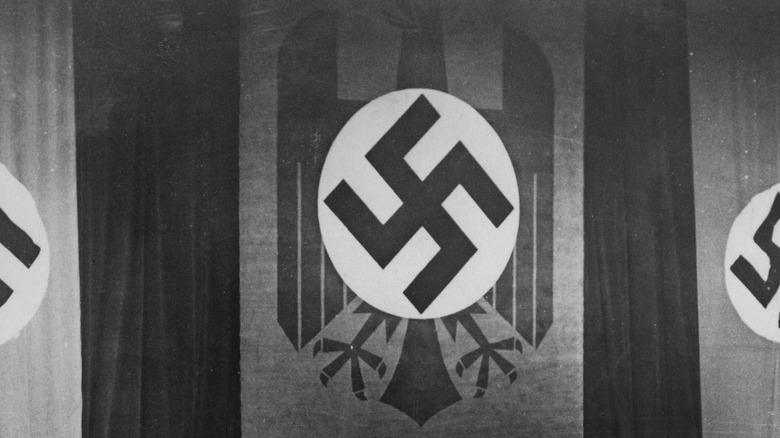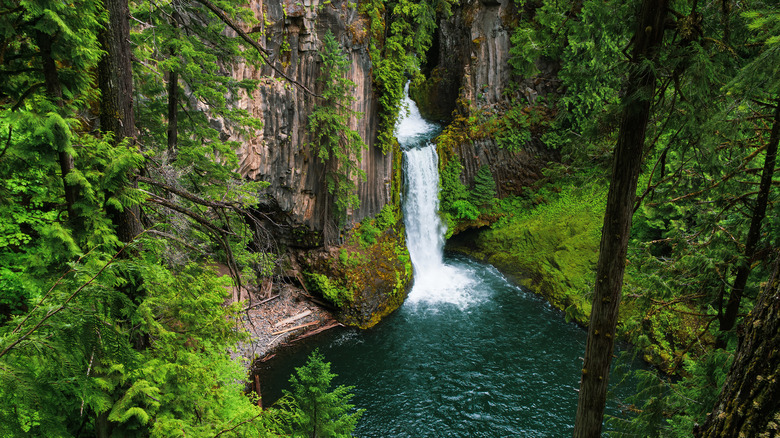One Oregon Mountain And Its Unfortunate Connection With Nazi Symbolism
Though it's hard to believe, there was once a time when the swastika symbol was not associated with the Nazis or their abhorrent ideology (via Smithsonian Magazine). Britannica writes that swastikas symbolized abundance and fortune. The BBC adds that the swastika was significant to various cultures and religions, including Christianity and Buddhism. So popular was this symbol that it was used by Coca-Cola and the Boy Scouts (per a different report from the BBC). Officially, the Nazi Party began using the symbol in the 1920s as they believed it was connected to their Aryan ancestors. Since then, the Holocaust Encyclopedia states, the swastika has come to represent fear, hate, and fascism.
In January 2022, the New York Post reported that two 19-year-olds had gone missing during a late December camping trip to Oregon's Swastika Mountain. The teens were missing for days but were rescued by the Coast Guard after writing SOS in the snow. According to NPR, 81-year-old Joyce McClain read about the rescue and was understandably appalled by the mountain's name. So much so that she came up with a plan. McClain told CNN, "I decided maybe I can't do anything, but I'm going to look into what it takes to change the name of the mountain." She then contacted the Oregon Geographic Names Board and the Oregon Historical Society (per Willamette Week).
Swastika Mountain predates Nazi Germany
Located in the Umpqua National Forest, which is near the city of Eugene, Oregon, Swastika Mountain was named in 1909 after a nearby town that was called Swastika (via KGW). CNN states that the town no longer exists. However, the origins of the town's name lie a local rancher. NPR explains that the owner of this ranch branded his cattle with the symbol. At the time, the swastika was not associated with the Nazis or Hitler. Thus, it's believed that the rancher chose the symbol as it directly translates into "well-being." When McClain went to the Oregon Geographic Names Board and Oregon Historical Society, they were unaware of the existence of the mountain.
Smithsonian Magazine reports that the volunteer-run board is responsible for renaming bodies of water and landscapes. Kerry Tymchuk, the executive secretary at the historical society told NPR, "It is not a very well-known mountain, and frankly, I didn't know there was one." Per Willamette Week, Tymchuk explained that the board, which meets twice a year, does not review any geographic names. Instead, it listens to proposals submitted by concerned citizens who think that a name might be inappropriate or even offensive. Despite this, Tymchuk acknowledged that the once-harmless meaning of Swastika Mountain had completely changed to something negative and "evil" (via NPR).
The mountain's new name will honor a tribal leader
In light of McClain's motion for a new name for Swastika Mountain, Tymchuk told CNN, "I suspect that if someone had proposed a new name, it would have been changed long ago." That said, the Willamette Week writes that McClain thought that Swastika Mountain should be renamed Umpqua mountain to honor an indigenous tribe that lived in the area. CNN adds that this name would also pay tribute to the Umpqua River and the Umpqua National Forest. However, a new name was proposed by a tribal historian; Mount Halo. This name would celebrate Chief Halito, otherwise known as Chief halo, of the nearby Yoncalla Kalapuya Tribe.
According to CNN, Chief Halito died in 1892. David Lewis from Oregon State University noted that the chief was remembered for fighting for his "right to remain on his land." The publication states that McClain is all in for this new name proposal. NPR reports that the Oregon Geographic Names Board will vote on this name change in December. It will then have to be approved by the U.S. Board on Geographic Names.
Although the name change is not official, McClain is still proud of what she's accomplished. She stated, "People need to come forward and take action when they see something that isn't right or needs to be changed, because one person can make a difference, and this shows how that is so true" (per NPR).


